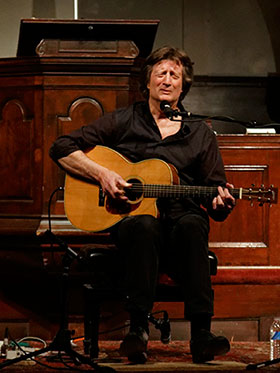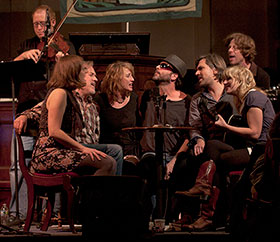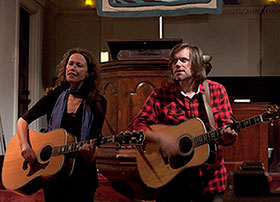About the Me&Thee coffeehouse
The Me&Thee coffeehouse is one of the oldest and most respected acoustic venues in the United States. And its rise to the top has been no accident. It’s the result of thousands of hours of volunteer love and labor from hundreds of people through the years who have given of themselves to provide a warm and professional atmosphere for this music to thrive.
As reporter Daniel Gewertz wrote in a 1995 cover story in North Shore Magazine, “The term “folk community” is used frequently among the musically inclined in New England … yet, there is one North Shore institution that so exemplifies the ideals of ‘folk community’ that no other term can apply.”
He goes on to write: “There isn’t a single salaried employee on the staff. From booking artists, creating the schedule and publicizing the gigs to selling the cider and tweaking the sound board, all the labor is volunteer.”
“The volunteers of the Me&Thee experience folk music from the inside; their relationship to the music isn’t just intimate, it’s positively interactive. And when they talk of the Me&Thee being like family, the term isn’t just a simile.”
And so it’s been since February 20, 1970, when three friends, including current Board member and coordinator Ralph Anthony Silva, began a ‘night of folk music’ under the watchful eyes of a few chaperons supplied by our host church, the Unitarian Universalist Church of Marblehead.
The Board of Trustees at the Church was somewhat apprehensive about allowing these young people to take over the place on a Friday night. They prohibited the use of the word “coffeehouse” out of fear that the “wrong element” would show up. In those days, the wrong element was thought to be “beatniks.” It was long before hippies came into vogue.
But after three highly successful Friday evenings, the chaperons joined the staff and the Me&Thee was born. At first, the coffeehouse only operated in the church’s small Stetson Gallery, seating about 75 people. The door charge was kept at a constant 50 cents and an eclectic menu of everything from peanut butter sandwiches to octopus and crackers was served at each table.
A varied schedule of local singers, poets, mimes, storytellers and even old films like Zorro and Flash Gordon was presented. The new minister at the church sometimes provided draft counselling in his office and rap sessions took place in the back room until the early morning hours all under the dark cloud of the raging Vietnam War.
The impetus for the coffeehouse, though, began with a youthful Anthony Silva’s vision and naivete. After visiting the Newport Folk Festival and seeing performers up close at such institutions as the Sword in the Stone, the Unicorn, the Idler and Club 47 in Boston and Cambridge, he was one of the first in the country to bring this music into the suburbs.
It was around the time that many small city clubs were closing and intimate venues started to disappear that the Me&Thee began.
Anthony grew up in an ethnic Portuguese family where music was part of everyday life. His father was an accomplished mandolin maker and player who was featured at the Lowell Folk Festival. His uncles all played instruments including guitar and banjo and the strains of music always accompanied family and seasonal celebrations. All of these experiences came together at the Me&Thee.
At first, the coffeehouse paid artists 15 or 20 dollars a night and they sang into cheap Radio Shack microphones but through the years, the level of performance and professionalism rose dramatically.
The Me&Thee has now expanded beyond its original concept to include a mix of new talent, up and coming stars and accomplished performers who have been around for years.
The coffeehouse’s performance space now includes the church sanctuary, which can be used in conjunction with Stetson Hall to seat over 300 people. In recent years performers have included Tom Rush, Odetta, Jean Redpath, Liv Taylor, Pete Seeger, Tommy Makem, and Jesse Winchester along with Patty Larkin, Greg Brown, Dar Williams, Claudia Schmidt, Suzanne Vega, Tracy Chapman, and the dean of Me&Thee performers, Bill Staines, who has performed at least annually at the club since its first week!
So now, after almost 1,000 performances over almost 30 years, the coffeehouse has become an “institution” according to a recent Frommer’s Guide to Massachusetts.
The Boston Globe’s Scott Alarik has labelled the Me&Thee “folk music’s living room,” while writer Jeff McLaughlin has said,“the Me&Thee has become one of the most prestigious venues north of Boston for first-rank performers.”
But the Me&Thee has resisted the temptation of becoming a concert hall. It is not. It’s a living, breathing folk community that exudes friendliness from the front door back. In a recent interview, founder Silva said:
“You go into a rock club and it’s usually very cold and dark and noisy. It’s not a place where you can converse easily. People assume social roles, there are the go-getters and the wallflowers and the pick-up experts. You gotta be on guard because people expect action.
“The Me&Thee, conversely, is similar to somebody’s home. After all, that’s why it’s called a coffee house. The Me&Thee has a nice fireplace in the winter, some people sit around tables and talk quietly until the music begins. Our famous two-set nights have given way to a longer break in the middle because people want to visit with each other.
When you walk into the place and see young couples with small children, high schoolers, and people with grey hair all sitting next to one another, there’s a message there.
This is an accessible place, a place where you can feel at home, even if you’re thousands of miles away from your family. That’s the magic of the Me&Thee. That’s the spark that has kept this fire going for longer than I ever thought possible.”


